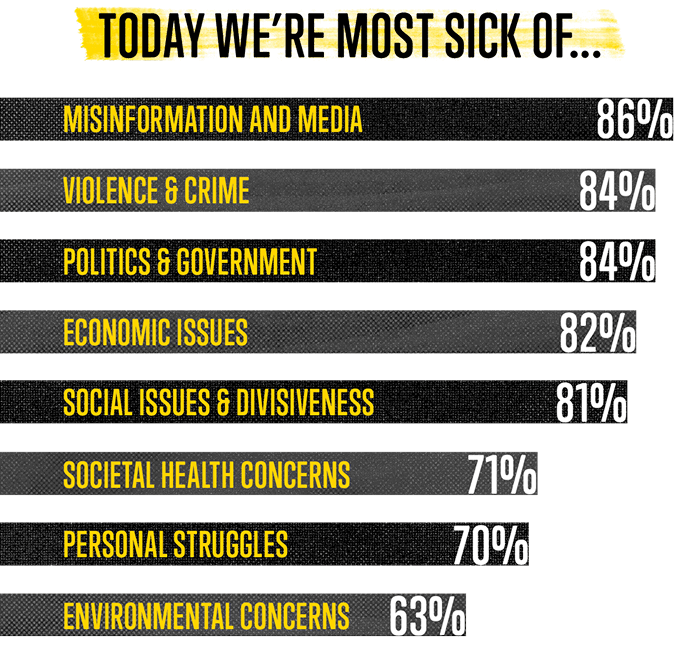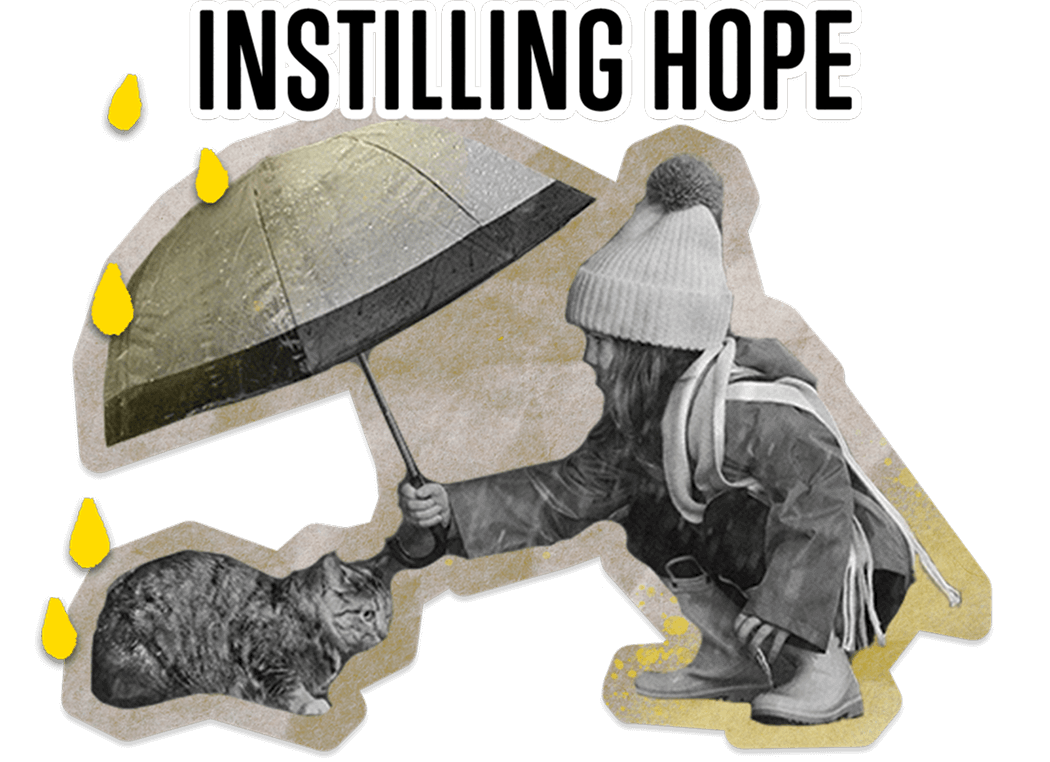We spoke with mental health experts to uncover the science behind Jesus’ teachings.
Everywhere we turn, there’s noise…bad news, endless opinions, and pressure to keep up. It leaves many of us anxious, restless, or simply worn down. But what if the way forward isn’t just found in self-help or quick fixes? What if both science and the teachings of Jesus point to practices, like rest, connection, and forgiveness, that can actually quiet the chaos and strengthen our mental health?
How can being "sick of" something affect our mental and physical health?

Jesus said, “Come to me, all you who are weary and burdened, and I will give you rest” (Matthew 11:28).
In other words, Jesus pointed to rest and release as a way to ease life’s burdens, an idea modern psychology affirms as essential for mental and physical health.
Dr. Avery Hoenig:
When we experience and believe that change does not happen no matter what we do, we learn helplessness, which is to give up and stop trying completely. Even when the situation shifts and it is possible to change the outcome, people don’t try and often become depressed.
Anxiety is another mental health issue that is connected to being sick of something. When we are anxious, many of us feel on edge which can cause irritability, tension, restlessness, sweating, shaking, nausea, and heart palpitations.
Dr. Cristina Sevadjian:
Feeling sick of something can lead to chronic stress. When unmanaged, this stress can lead to a variety of health issues, including high blood pressure, heart disease, stroke, obesity, and diabetes.
We identified eight categories that people are “sick of.” What methods/advice do you offer patients with these kinds of frustrations?

Jesus said, “Do not worry about tomorrow, for tomorrow will worry about itself. Each day has enough trouble of its own” (Matthew 6:34).
Here, Jesus encourages focusing on what’s in front of us today—mirroring the therapeutic practice of distinguishing what we can and cannot control.
Dr. Cristina Sevadjian:
I often have people map out their concerns on a big whiteboard in my office. I ask them to brainstorm all the things that create stress in their lives. I then ask them to circle the issues they have direct control over and put an x next to the things that are outside their control. Categorizing stressors helps people feel less overwhelmed and know when to engage in problem-solving strategies or how to improve their coping strategies.
Jesus taught others the importance of community and connection. How does community and connection impact our mental/physical health?

Jesus said, “Love one another. As I have loved you, so you must love one another” (John 13:34).
His teaching reflects what science now shows: belonging and connection aren’t optional, they’re vital for our wellbeing.
Dr. Avery Hoenig:
Research indicates that belonging is a basic human need, so community and connection are of utmost importance for our mental and physical health. In my professional experience, I’ve seen people do best when they feel part of something bigger than themselves.
Dr. Cristina Sevadjian:
We know from research that social disconnectedness and isolation have a negative impact on our mental health. We also know that friendships can protect us from more serious mental health issues.
Jesus taught that forgiveness is a pathway to peace. How does forgiveness impact our mental/physical health?

Jesus said, “Forgive, and you will be forgiven” (Luke 6:37).
His words point to release and restoration, which aligns with research showing forgiveness lowers stress, depression, and even physical strain.
Dr. Avery Hoenig:
Research indicates that forgiveness is often associated with reduced depression, anxiety, and stress and can have significant physical implications such as lowered blood pressure, risk of heart attack, and pain.
Dr. Cristina Sevadjian:
In my professional experience, I talk to individuals a lot about how carrying around anger and unforgiveness has more negative consequences on themselves than it will most likely ever have on the person that they are upset with.
Jesus came from humble beginnings. He wasn’t rich yet he taught others to practice generosity and gratitude. How can practicing those things affect our mental and physical health?

Jesus said, “It is more blessed to give than to receive” (Acts 20:35).
And when one leper returned to thank him, Jesus asked, “Has no one returned to give praise to God except this foreigner?” (Luke 17:18).
Both generosity and gratitude were central in Jesus’ life, and today’s research confirms that they elevate happiness and protect mental health.
Dr. Cristina Sevadjian:
Research shows that generosity has a positive impact on mood and a general sense of happiness, while reducing the impact of negative emotions. Gratitude as well, as a practice, can really help people shift their perspective in noticing the little things in their life, which can increase happiness and general well-being. It can also provide an important buffer from anxiety, depression, and other mental health concerns.
Jesus experienced the full range of emotions, including hope. Something he encouraged often. How does remaining hopeful affect our mental/physical health?

Jesus said, “Peace I leave with you; my peace I give you. I do not give to you as the world gives. Do not let your hearts be troubled and do not be afraid” (John 14:27).
Jesus’ promise of peace resonates with science’s findings: that hope and calm can strengthen immunity, improve resilience, and ease suffering.
Dr. Avery Hoenig:
Hope has a positive impact on our physical health as it improves the functioning of our immune system and decreases our experience of pain. In addition, hope is associated with lower levels of depression, better relationships, and resilience.
Are there any other humanitarian or altruistic methods supported by research that can help us overcome our discontent? If so, what are they? How do they help?
Jesus said, “Love your neighbor as yourself” (Mark 12:31).
He also taught, “Do to others as you would have them do to you” (Luke 6:31).
These teachings echo what psychology now calls self-compassion and empathy, ways of caring for ourselves and others that lower stress and build resilience.
Dr. Avery Hoenig:
When life gets difficult, self-compassion, the act of turning compassion inward — can be a real lifesaver. When we treat ourselves with compassion, we treat ourselves the way we would someone we love. In other words, we treat ourselves with kindness instead of judgment.
Tying it all together
Community, forgiveness, gratitude, hope — all of these things that Jesus taught and modeled have measurable effects on our mental health, lives, and neighborhoods. It seems that Jesus valued and prioritized mental health. He protected personal time and rest for himself on many occasions. Safeguarding our health is one of the best ways to practice self-love, and Jesus famously taught those around him “to love one another as yourself.”
Perhaps the way and teachings of Jesus aren’t just a list of rules but a helpful blueprint for human flourishing. After all, how can we flourish and encourage others to do the same if our mental and physical health isn’t protected? What do you think?
Doctors References
Dr. Avery Hoenig completed her undergraduate study at Southern Methodist University and earned her Ph.D. in clinical psychology from UT Southwestern Medical Center at Dallas. She has worked in private practice for over 15 years and uses Cognitive Behavioral Therapy to help older adolescents and adults manage mood- and anxiety-related symptoms.
Dr. Cristina Sevadjian graduated with a bachelor’s degree in psychology from Texas A&M University, a master’s degree in counseling from Dallas Baptist University, and her doctorate from the APA accredited school psychology program through Texas Woman’s University. She has worked in the field of psychology for 20 years and has a variety of experiences serving individuals in the following settings: home-based treatment with the juvenile probation department, Green Oaks Psychiatric Hospital, local children’s hospitals, public school districts, and private practice.
Bible References: Matthew 11:28, Matthew 6:34, John 13:34, Luke 6:37, Acts 20:35, Luke 17:18, John 14:27, Mark 12:31, Luke 6:31
Science References
Kamarck, T. W., et al., Psychosomatic Medicine, Vol. 52, No. 1, 1990
Schnall, S., et al., Journal of Experimental Social Psychology, Vol. 44, No. 5, 2008
Bayer, J. K., et al., Child and Adolescent Mental Health, Vol. 23, No. 4, 2018
Baskin TW, & Enright RD (2004). Intervention studies on forgiveness: A meta-analysis. Journal of Counseling & Development, 82(1), 79-90. 10.1002/j.1556-6678.2004.tb00288.x
Lawler KA, Younger JW, Piferi RL, Jobe RL, Edmondson KA, & Jones WH (2005). The unique effects of forgiveness on health: An exploration of pathways. Journal of Behavioral Medicine, 28(2), 157-167.10.1007/s10865-005-3665-2
Lee Y-R, & Enright RD (2019). A meta-analysis of the association between forgiveness of others and physical health. Psychology & Health, 34, 626-643. 10.1080/08870446.2018.1554185
Harvard Health: Giving thanks can make you happier
https://www.health.harvard.edu/healthbeat/giving-thanks-can-make-you-happier
Iodice JA, Malouff JM, Schutte NS (2021) The Association between Gratitude and Depression: A Meta-Analysis. Int J Depress Anxiety 4:024 .doi.org/10.23937/2643-4059/1710024
Aaker, J., & Liu, W. (2008). The Happiness of Giving: The Time-Ask Effect. Journal of Consumer Research, 35(3), 543-557. https://doi.org/10.1086/588699

